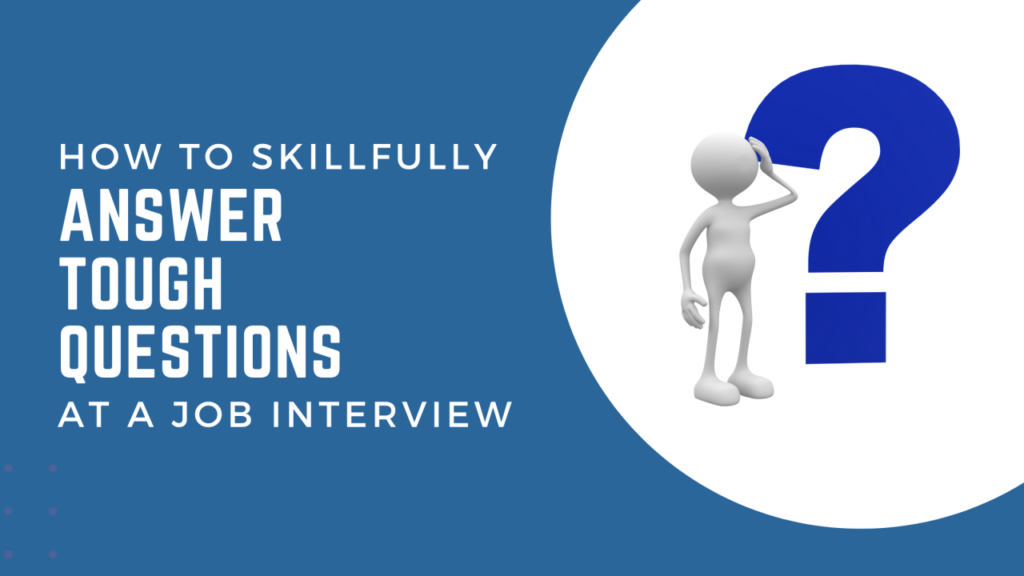
The goal of every candidate in a job interview is to come across as confident, personable and knowledgeable. You will be asked a lot of questions and some of them can throw you off.
Getting flustered can affect your ability to make a good impression and make you look unsure and ill-prepared. Navigating through difficult conversations and finding the right words in the moment can be daunting.
When faced with tough questions, you need to be ready to handle them with grace and professionalism. Here are some ways to deftly keep a conversation on track and make a solid impression at an interview.
- Being asked to explain why you’re leaving your current job
There are many reasons behind the decision to move on to another job, from career advancement to company restructuring, better compensation etc. If it’s because of a personal issue or disagreement, it’s best not to discuss it during the interview.
If you’re inevitably asked about it, offer a thoughtfully considered yet concise response. Reframe the negative experience in more professional, discreet and positive terms.
Talk about what you learned from that job experience, specifically how it shaped your work ethic or how it prepared you for your next role. Focus on how you’re looking forward to being part of a new company and how your previous experience can help you add value to their organization.
- You don’t have enough years of experience
While experience is one of the most important factors that influence hiring decisions, it’s not always the most decisive indicator of a candidate’s competence. It’s important to note that the years of experience does not automatically translate to the depth and quality of that work experience.
Let’s say you fall short of the years of experience. Hiring managers look for a combination of attributes so it’s best to shine a light on them. Go back to the job listing and review the desired qualifications.
Talk about the breadth of your knowledge, career achievements, trainings, soft skills and explain how they can help you succeed in the role.
- Questions on skills or processes you’re not familiar with
If the interviewer asks you about a skill you don’t have or a process you’re not familiar with, be transparent about what you know and your experience. While it’s sensible to put your best foot forward, don’t oversell yourself at the expense of honesty and integrity.
Instead of talking about your shortcomings, zero in on your other qualities and how relevant they are to learning that skill or process. Talk about soft skills such as your adaptability and capacity for learning.
Cite specific instances where you were able to learn a process or software that was unfamiliar to you or how you were able to quickly develop a skill you didn’t initially possess.
- What sets you apart from the others
This question doesn’t really ask you to make an assessment on how well you stack up against other candidates. Unless you know the candidate pool really well, this isn’t the best approach to crafting the perfect response.
Establish a competitive edge by highlighting your unique qualities. These can be specific personality traits, soft skills and trainings that you feel will be critical to succeeding in the job.
Illustrate them by providing specific examples that show off these qualities and reference how relevant they are to the job requirements. Paint a picture for the interviewer so they can see you as the most viable candidate for the role.
- Salary expectation
Conversations about salary can be tricky to navigate. Do your research and know the range for the position in that area/ location. You don’t want to be too forthcoming on the issue of salary.
You may want to lead with asking for more insights about the job, e.g. tasks, duties, day-to-day responsibilities, since it could be a factor in determining salary expectations. This way you’re giving the impression that you’re also trying to gauge whether you’re a good fit for the role and are not just motivated by compensation.
If the salary offered falls within your expected range, let the interviewer know. If it’s a little less, tactfully mention that it’s less than you’re expecting and ask if it can be adjusted for the right candidate.
Job interview questions can go so many ways. With preparation and skillful conversation, you can definitely answer the toughest of questions with ease and confidence.






